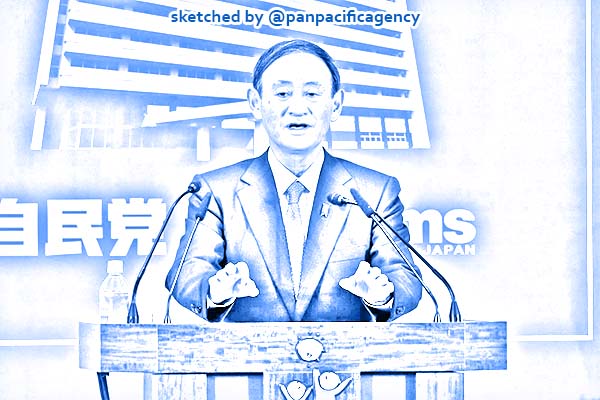[Analytics] Can Japan lead the post-Covid-19 world in global health?

Yoshihide Suga gestures at a news conference after winning the Liberal Democratic Party’s leadership election on Monday. | BLOOMBERG. Sketched by the Pan Pacific Agency.
After seven years and eight months, the Shinzo Abe administration — the longest serving government in Japan’s parliamentary history — ended abruptly in late August due to Abe’s health problems. The merits and demerits of the Abe administration will be the subject of much debate, but at least on global health, especially universal health coverage, it achieved a great deal. Haruka Sakamoto specially for the East Asia Forum.
Japan has sought to address the importance of global health in the past. For example, infectious disease was a main agenda item both at the 1997 G8 Birmingham Summit and 2000 G8 Kyushu–Okinawa Summit. During the former, then prime minister Hashimoto advocated the importance of addressing neglected tropical diseases and launched the ‘Hashimoto initiative’, while the latter led to the creation of the Global Fund to fight AIDS, Tuberculosis and Malaria, now the largest international body for infectious disease control.
The Abe administration greatly increased Japan’s presence in the global health sphere. After the 2014 Ebola outbreak in West Africa, global discussions about global health governance, including World Health Organization (WHO) reform, were still in full swing. Against this backdrop, the Abe administration promoted global health as a major agenda item at the 2016 G7 Ise-Shima Summit, including global health governance and the importance of strengthening health systems for better preparedness for future pandemics — a fundamental basis for attaining universal health coverage by 2030, as stated in the Sustainable Development Goals.
Another historic occasion during the Abe administration was the sixth summit of the Tokyo International Conference on African Development (TICAD) in 2016. Japan has been hosting TICAD since 1998 with the intention of strengthening relations with African countries. 2016 was the first time that global health was a major agenda item at TICAD. It is a great achievement that African leaders recognised the close relationship between health and socioeconomics, and pushed global health issues as a priority. Global health had previously been discussed at the level of national health ministers, but these conferences made global health reach the agendas of heads of state.
Japan continued to occupy a leadership role in global health throughout Abe’s time in office, raising global health issues on the international stage, such as at the 2019 G20 Osaka Summit and at the UN High-Level Meeting on Universal Health Coverage in 2019. At the 2019 UN High-Level Meeting on universal health coverage, Abe was invited to make an address because of his and Japan’s distinguished contribution in this area.
During the Liberal Democratic Party leadership race to replace Abe as prime minister, the economy, foreign affairs and social welfare issues relating to Japan’s ageing population and low birth rate came to occupy the main focus in party debates. Oddly, global health has been absent from the main agenda. The newly elected Prime Minister, Yoshihide Suga, did not mention any health issues in his election campaign other than in the immediate context of fighting COVID-19. Suga said that he will follow Abe’s footsteps, but his ambitions regarding global health remain unclear. It is promising that Suga has been in charge of Japan’s COVID-19 response since the beginning of the outbreak as Abe’s chief cabinet secretary.
Japan’s main domestic focus is figuring out how to control the coronavirus while resuming socioeconomic activities. But it will be tremendously difficult to overcome the COVID-19 challenge without global cooperation. Ensuring a reliable supply of vaccines, resuming overseas business travel and hosting the Tokyo Olympic and Paralympic Games all require global cooperation.
COVID-19 responses, especially the WHO’s response, have been highly politicised, making solidarity and cooperation on global health issues more difficult. One positive development is the establishment of COVAX — between the GAVI, the Coalition for Epidemic Preparedness Innovations and the WHO — which aims to ‘accelerate the development and manufacture of COVID-19 vaccines, and to guarantee fair and equitable access for every country in the world’. So far the United States, China and Russia have not joined this framework, though Japan and many European countries have announced their willingness to participate, showing their support for increased global cooperation in tackling COVID-19.
There is no doubt that COVID-19 has posed a significant challenge to global health governance, including the role of the WHO. There will surely be much debate about the future of global health governance. It is increasingly unclear which countries and organisations will assume leadership roles in global health. Perhaps Prime Minister Suga will lead the debate on global health in the post-COVID-19 world, just as his predecessor Abe did after the 2014 Ebola outbreak.
Haruka Sakamoto is Assistant Professor and physician at the Department of Health Policy and Management, Keio University.